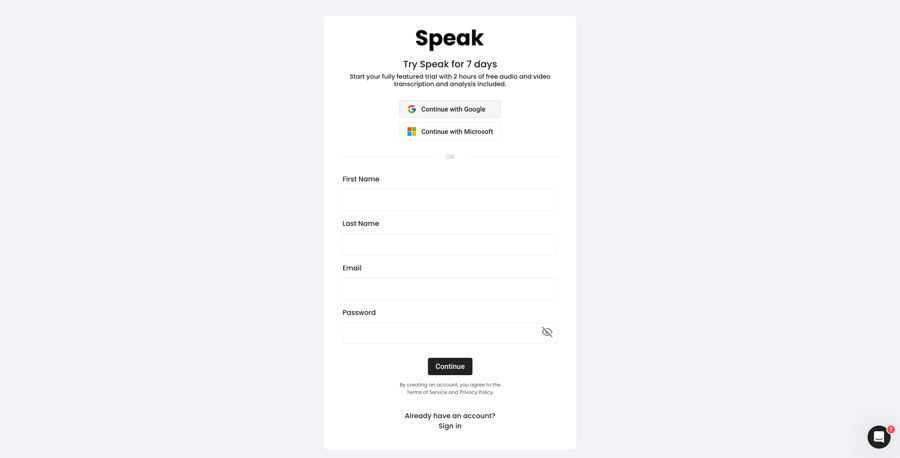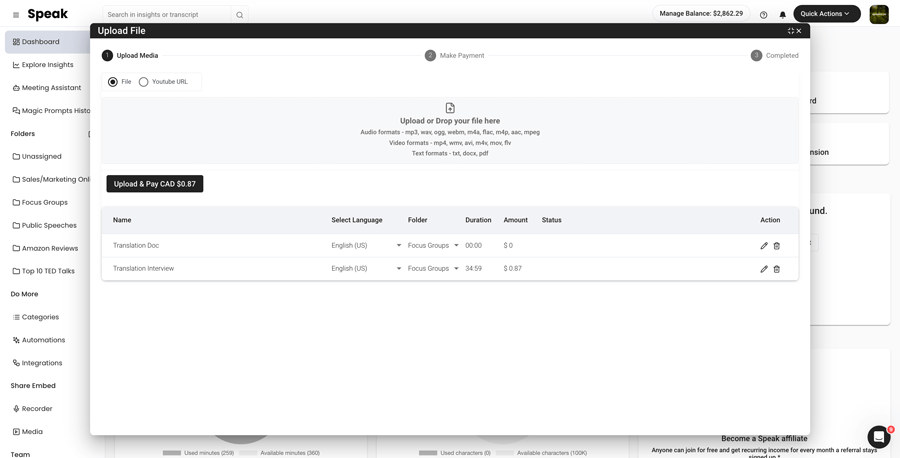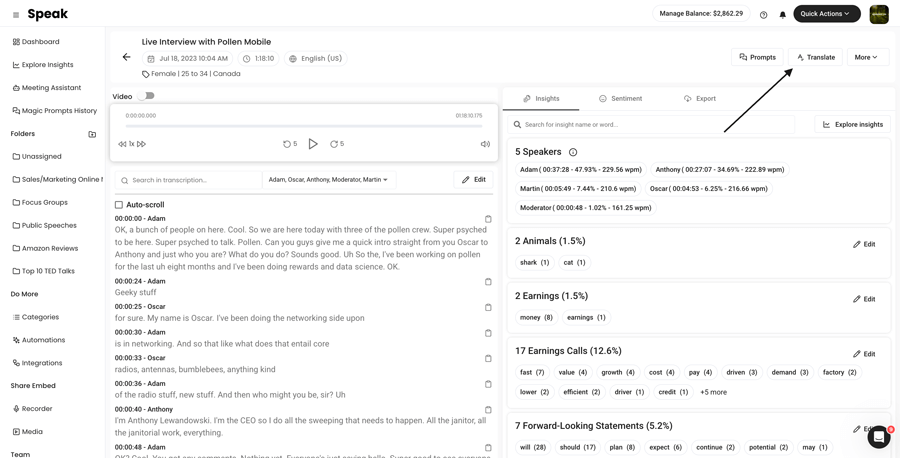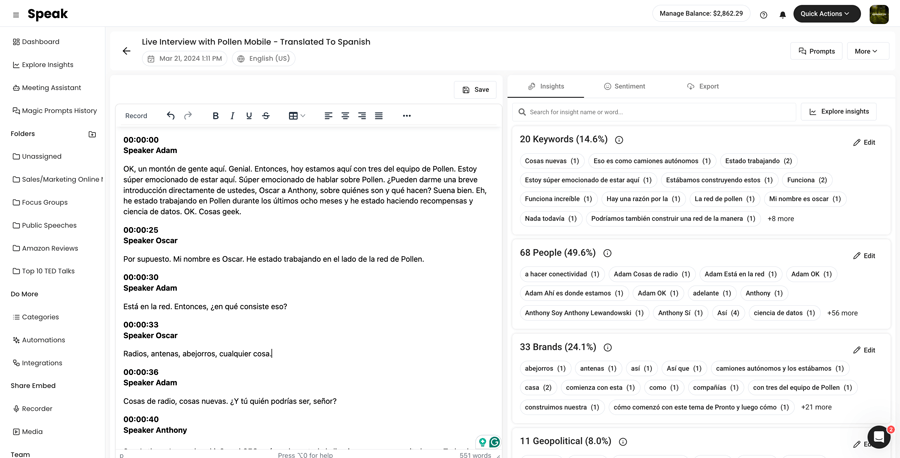How To Translate Japanese to English (South African)
Translating Japanese to English (South African) is super simple!

Step 1: Register for Speak
Register for Speak using this link.
Once you register, you can instantly begin translating your Japanese to English (South African) file(s).

Step 2: Upload Your Japanese file(s)
As soon as you log in, you will be redirected to the dashboard.
Once there, you can select the Quick Action "New Upload".
In Speak, you can seamlessly upload, transcribe and translate audio, video and text files all at once!

Step 3: Translate Your Japanese file(s) to English (South African)
Once the file is uploaded, simply visit your file and select "Translate".
If it is an audio and video file, Speak will ask you if you want to keep the speaker names and timestamps in the translation.
Want to translate many files at once? No problem!
You can view the files you want to automatically translate from Japanese to English (South African) from the folder level and instantly translate as many files as you need with our artificial intelligence translation in just a few clicks.

Step 4: That's It! View, Analyze, Modify & Export Your New English (South African) file(s)
Once the translation is done, you will be alerted and you will see a new document in the same folder your original file is in.
The file will be named the same but with a dash indicating that it is the translated version.
Need support with your Japanese translation?
We are always here and happy to help at Speak!
Just send us a message on live chat on the bottom right corner and we will ensure you are set up for success.
Interested in translating Japanese or other languages to different languages? View our entire list of supported translation languages here.
Automatic, accurate, instant AI translation from Japanese to English (South African) is here for you.
Register for Speak using this link and begin translating Japanese to English (South African) today.
The Revolutionary Impact of AI Translation: Bridging Japanese and English (South African)
In today’s interconnected world, the ability to communicate across language barriers is more vital than ever. This is especially true when it comes to translating between Japanese and English (South African)—two languages that are crucial for researchers and businesses alike. With the integration of NLP (Natural Language Processing), large language models, and Generative AI, Speak AI is at the forefront of making seamless communication a reality.
Unveiling the Magic of Automatic Translation
Automatic translation is not just about converting words from one language to another; it's about preserving the essence, tone, and nuances of the original content. As Speak AI, we understand this deeply. Our AI Meeting Assistant, capable of joining platforms like Microsoft Teams, Zoom, Google Meet, and Webex, is revolutionizing how content is transcribed, translated, and analyzed—offering invaluable time and cost savings.
Benefits That Speak Volumes
- Accuracy: Leveraging AI and NLP, translations from Japanese to English (South African) maintain a high level of accuracy, capturing nuances that traditional methods might miss.
- Efficiency: Instantaneous translations speed up communication, decision-making, and project timelines, especially for businesses and researchers working across these languages.
- Cost-Effectiveness: By reducing the need for human translators for initial drafts or everyday communications, significant cost savings can be realized.
- Accessibility: Automatic translation opens up access to information, research, and markets that were previously hindered by language barriers.
Real-World Applications
From academic research that involves sourcing information from Japanese studies to businesses aiming to tap into the South African English-speaking market, the applications are vast. Additionally, content creators can effortlessly engage wider audiences by translating their material, making global reach an achievable goal.
The Global Landscape of Japanese and English (South African)
Where These Languages Dominate
Japanese is primarily spoken in Japan, a country with a rich history and a significant global economic footprint. On the other hand, English, with its South African variant, is one of the most widely spoken languages in South Africa—a nation known for its diversity and cultural heritage. Both languages have far-reaching influences, not just within their territories but globally, in areas of technology, business, and academia.
Statistics and Historical Insights
Japan boasts a population of over 126 million people, with Japanese being the predominant language. In South Africa, English, while not the most spoken language, serves as a lingua franca and is one of the country’s 11 official languages. South Africa's population, exceeding 60 million, showcases a tapestry of cultures and languages, with English (South African) serving as a critical bridge among them.
Diving into the Intricacies of Japanese and English (South African)
An Array of Fun Facts
- Japanese is known for its three writing systems: Hiragana, Katakana, and Kanji, each serving different roles in the language.
- English (South African) is flavored with unique idioms and expressions, reflecting the nation’s multicultural makeup.
Understanding the Differences and Similarities
The grammatical structure, phonetics, and writing systems of Japanese and English (South African) are markedly different, presenting substantial challenges in translation. However, both languages share a rich history of borrowing terms from other languages and adapting them, showcasing a fascinating interplay of linguistic evolution.
The Speak AI Advantage
With a 4.9 rating on G2 and over 150K users, Speak AI’s prowess in translating Japanese to English (South African) is unparalleled. Our commitment to accuracy, efficiency, and user satisfaction sets us apart in the realm of AI translation and transcription services. Whether you are a business aiming to broaden your reach, a researcher seeking expanded access to global studies, or a content creator desiring to connect with diverse audiences, Speak AI is your trusted partner in breaking down linguistic barriers.
Take the leap with Speak AI. Experience the future of communication today, and let's bridge the world through language together. For more details and to join our growing community, visit our website and discover how we can transform your linguistic needs into a seamless and productive experience.
Conclusion: A World Connected Through Language
In the era of global connectivity, translating Japanese to English (South African) is not just about text conversion; it’s about connecting hearts and minds across continents. Speak AI is dedicated to enhancing this connection, offering solutions that transcend traditional translation barriers. Join us in embracing the rich diversity of human language, and let's drive innovation, understanding, and growth together.
Translate Japanese To These Other Supported Languages:
- Translate Japanese-to-Arabic (Egypt)
- Translate Japanese-to-Arabic (Iraq)
- Translate Japanese-to-Arabic (Israel)
- Translate Japanese-to-Arabic (Jordan)
- Translate Japanese-to-Arabic (Kuwait)
- Translate Japanese-to-Arabic (Lebanon)
- Translate Japanese-to-Arabic (Oman)
- Translate Japanese-to-Arabic (Palestinian Authority)
- Translate Japanese-to-Arabic (Qatar)
- Translate Japanese-to-Arabic (Saudi Arabia)
- Translate Japanese-to-Arabic (Syrian Arab Republic)
- Translate Japanese-to-Arabic (United Arab Emirates)
- Translate Japanese-to-Arabic Modern Standard (Bahrain)
- Translate Japanese-to-Armenian
- Translate Japanese-to-Bulgarian
- Translate Japanese-to-Catalan
- Translate Japanese-to-Chinese (Cantonese, Traditional)
- Translate Japanese-to-Chinese (Simplified)
- Translate Japanese-to-Chinese (Traditional)
- Translate Japanese-to-Croatian
- Translate Japanese-to-Czech
- Translate Japanese-to-Danish
- Translate Japanese-to-Dutch
- Translate Japanese-to-English
- Translate Japanese-to-English (Australia)
- Translate Japanese-to-English (India)
- Translate Japanese-to-English (Ireland)
- Translate Japanese-to-English (New Zealand)
- Translate Japanese-to-English (Scottish)
- Translate Japanese-to-English (South African)
- Translate Japanese-to-English (United Kingdom)
- Translate Japanese-to-English (United States)
- Translate Japanese-to-Estonian
- Translate Japanese-to-Farsi
- Translate Japanese-to-Finnish
- Translate Japanese-to-French
- Translate Japanese-to-French (Canada)
- Translate Japanese-to-German
- Translate Japanese-to-German (Swiss)
- Translate Japanese-to-Greek
- Translate Japanese-to-Gujarati
- Translate Japanese-to-Hebrew
- Translate Japanese-to-Hindi
- Translate Japanese-to-Hungarian
- Translate Japanese-to-Icelandic
- Translate Japanese-to-Indonesian
- Translate Japanese-to-Irish
- Translate Japanese-to-Italian
- Translate Japanese-to-Japanese
- Translate Japanese-to-Kannada
- Translate Japanese-to-Korean
- Translate Japanese-to-Latvian
- Translate Japanese-to-Lithuanian
- Translate Japanese-to-Malay
- Translate Japanese-to-Malayalam
- Translate Japanese-to-Norwegian
- Translate Japanese-to-Persian
- Translate Japanese-to-Polish
- Translate Japanese-to-Portuguese
- Translate Japanese-to-Portuguese (Brazilian)
- Translate Japanese-to-Portuguese (Portugal)
- Translate Japanese-to-Romanian
- Translate Japanese-to-Russian
- Translate Japanese-to-Slovak
- Translate Japanese-to-Slovenian
- Translate Japanese-to-Spanish
- Translate Japanese-to-Spanish (Mexico)
- Translate Japanese-to-Swedish
- Translate Japanese-to-Tamil
- Translate Japanese-to-Telugu
- Translate Japanese-to-Thai
- Translate Japanese-to-Turkish
- Translate Japanese-to-Ukrainian
- Translate Japanese-to-Vietnamese



